介词in
介词in的用法汇总

介词“in”的用法1: 年、月、年月、季节、周即在"来年",在"某月",在"某年某月" (但在某年某月某日则用on),在四季,在第几周等都要用in。
例;in 1986 在1986年in 1927 在1927年in April 在四月in March 在三月in December 1986 1986年12月in July l983 1983年7月in spring 在春季 in summer 在夏季in autumn 在秋季 in winter 在冬季in the fist week of this semester 这学期的第一周in the third week 在第三周2: 阳光、灯、影、衣、冒 in,即在阳光下,在灯下,在树阴下,穿衣、着装、冒雨等都要用in。
例:Don't read in dim light. 切勿在暗淡的灯光下看书。
They are reviewing their lessons in the bright light. 他们在明亮的灯光下复习功课。
They are sitting in the shade of a tree. 他们坐在树阴下乘凉。
a prisoner in irons带着镣铐的囚犯He went in the rain to meet me at the station. 他冒雨到车站去接我。
The poor dressed (clothed) in rags in old society.旧社会穷人们衣衫褴褛.以及:in the bright sunlight在明亮的阳光下a merchant in disguise 乔装的商人the woman in white (black, red, yellow) 穿着白(黑、红、黄)色衣服的妇女in uniform 穿着制服in mourning 穿着丧服in brown shoes 穿着棕色鞋in his shirt sleeves 穿着衬衫3: 将来时态in...以后例: They will come back in 10 days. 他们将10天以后回来。
总结介词in的用法
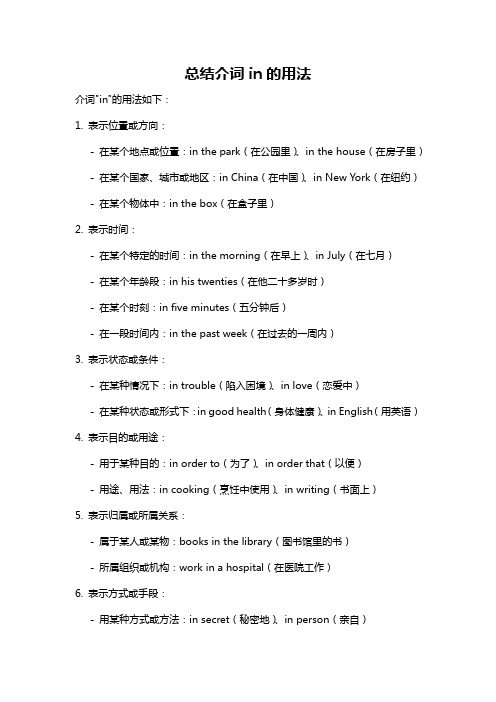
总结介词in的用法介词"in"的用法如下:1. 表示位置或方向:- 在某个地点或位置:in the park(在公园里)、in the house(在房子里)- 在某个国家、城市或地区:in China(在中国)、in New York(在纽约)- 在某个物体中:in the box(在盒子里)2. 表示时间:- 在某个特定的时间:in the morning(在早上)、in July(在七月)- 在某个年龄段:in his twenties(在他二十多岁时)- 在某个时刻:in five minutes(五分钟后)- 在一段时间内:in the past week(在过去的一周内)3. 表示状态或条件:- 在某种情况下:in trouble(陷入困境)、in love(恋爱中)- 在某种状态或形式下:in good health(身体健康)、in English(用英语)4. 表示目的或用途:- 用于某种目的:in order to(为了)、in order that(以便)- 用途、用法:in cooking(烹饪中使用)、in writing(书面上)5. 表示归属或所属关系:- 属于某人或某物:books in the library(图书馆里的书)- 所属组织或机构:work in a hospital(在医院工作)6. 表示方式或手段:- 用某种方式或方法:in secret(秘密地)、in person(亲自)- 走某个路径或通过某个方式:send it in the mail(通过邮寄发送)7. 其他用法:- 表示传统或情境:in China, people eat dumplings on Chinese New Year.(在中国,人们在中国农历新年吃饺子。
)- 表示限制或范围:in this case(在这种情况下)、in my opinion(在我看来)总之,介词"in"的用法多种多样,可以表示位置、时间、状态、目的、归属等各种关系和概念。
in用法及短语
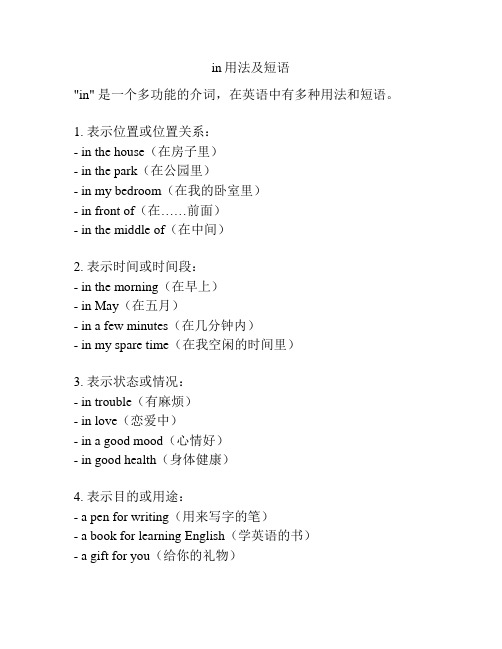
in用法及短语"in" 是一个多功能的介词,在英语中有多种用法和短语。
1. 表示位置或位置关系:- in the house(在房子里)- in the park(在公园里)- in my bedroom(在我的卧室里)- in front of(在……前面)- in the middle of(在中间)2. 表示时间或时间段:- in the morning(在早上)- in May(在五月)- in a few minutes(在几分钟内)- in my spare time(在我空闲的时间里)3. 表示状态或情况:- in trouble(有麻烦)- in love(恋爱中)- in a good mood(心情好)- in good health(身体健康)4. 表示目的或用途:- a pen for writing(用来写字的笔)- a book for learning English(学英语的书)- a gift for you(给你的礼物)5. 表示成员或归属关系:- a student in the class(班级中的学生)- a player in the team(球队中的球员)- a citizen in the country(国家的公民)6. 表示方式或手段:- in English(用英语)- in writing(以书面形式)- in person(亲自)常见的短语:- in general(一般而言)- in conclusion(总而言之)- in fact(事实上)- in addition(此外)- in the end(最后)- in the meantime(与此同时)- in order to(为了)- be in charge(负责)- be in favor of(支持)- be in touch(保持联系)这仅是"in"的一些常见用法和短语,实际上,它的用法非常广泛,可以根据具体语境进行灵活运用。
介词的用法in on at
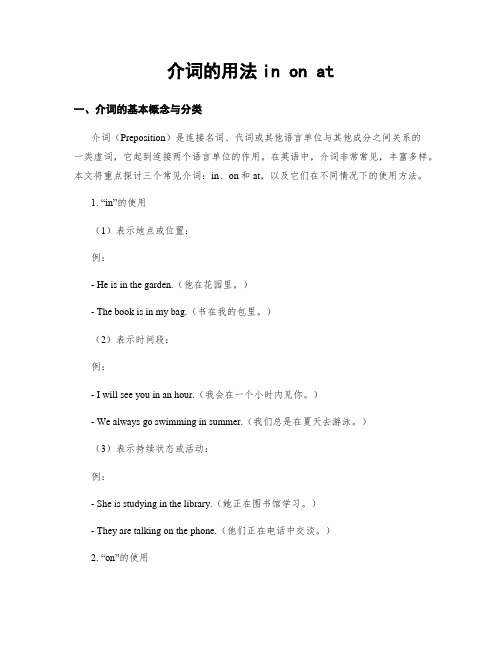
介词的用法in on at一、介词的基本概念与分类介词(Preposition)是连接名词、代词或其他语言单位与其他成分之间关系的一类虚词,它起到连接两个语言单位的作用。
在英语中,介词非常常见,丰富多样。
本文将重点探讨三个常见介词:in、on和at,以及它们在不同情况下的使用方法。
1. “in”的使用(1)表示地点或位置:例:- He is in the garden.(他在花园里。
)- The book is in my bag.(书在我的包里。
)(2)表示时间段:例:- I will see you in an hour.(我会在一个小时内见你。
)- We always go swimming in summer.(我们总是在夏天去游泳。
)(3)表示持续状态或活动:例:- She is studying in the library.(她正在图书馆学习。
)- They are talking on the phone.(他们正在电话中交谈。
)2. “on”的使用(1)表示表面或位置:例:- The cup is on the table.(杯子放在桌子上。
)- She sat on the chair. (她坐在椅子上。
)(2)表示日期或特定日子:例:- We have a party on Saturday night. (我们星期六晚上要参加一个聚会。
)- Christmas falls on December 25th.(圣诞节在12月25日。
)(3)表示接触或联系:例:- Please write your name on the paper. (请把你的名字写在这张纸上。
)- I will call you on the phone. (我会打电话给你。
)3. “at”的使用(1)表示具体时间点或某个事件:例:- The meeting starts at 9 o'clock.(会议九点钟开始。
in的用法归纳与总结
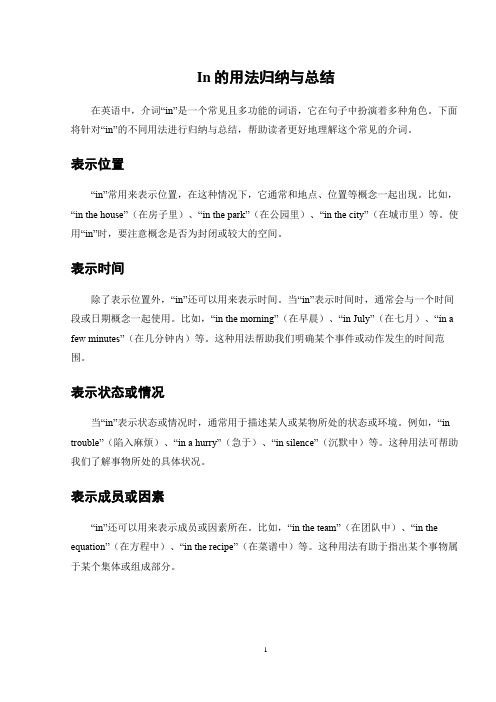
In的用法归纳与总结在英语中,介词“in”是一个常见且多功能的词语,它在句子中扮演着多种角色。
下面将针对“in”的不同用法进行归纳与总结,帮助读者更好地理解这个常见的介词。
表示位置“in”常用来表示位置,在这种情况下,它通常和地点、位置等概念一起出现。
比如,“in the house”(在房子里)、“in the park”(在公园里)、“in the city”(在城市里)等。
使用“in”时,要注意概念是否为封闭或较大的空间。
表示时间除了表示位置外,“in”还可以用来表示时间。
当“in”表示时间时,通常会与一个时间段或日期概念一起使用。
比如,“in the morning”(在早晨)、“in July”(在七月)、“in a few minutes”(在几分钟内)等。
这种用法帮助我们明确某个事件或动作发生的时间范围。
表示状态或情况当“in”表示状态或情况时,通常用于描述某人或某物所处的状态或环境。
例如,“in trouble”(陷入麻烦)、“in a hurry”(急于)、“in silence”(沉默中)等。
这种用法可帮助我们了解事物所处的具体状况。
表示成员或因素“in”还可以用来表示成员或因素所在。
比如,“in the team”(在团队中)、“in the equation”(在方程中)、“in the recipe”(在菜谱中)等。
这种用法有助于指出某个事物属于某个集体或组成部分。
表示方式“in”还可用来表示方式或手段。
例如,“in English”(用英语)、“in pencil”(用铅笔)、“in secret”(秘密地)等。
这种用法强调了做某事的方式或手段。
其他用法除了以上几种常见用法外,“in”还有一些其他用法。
例如,“in order to”(为了)、“be in favor of”(赞成)、“in comparison with”(与…相比)、“in conclusion”(总之)等。
in的用法及区别
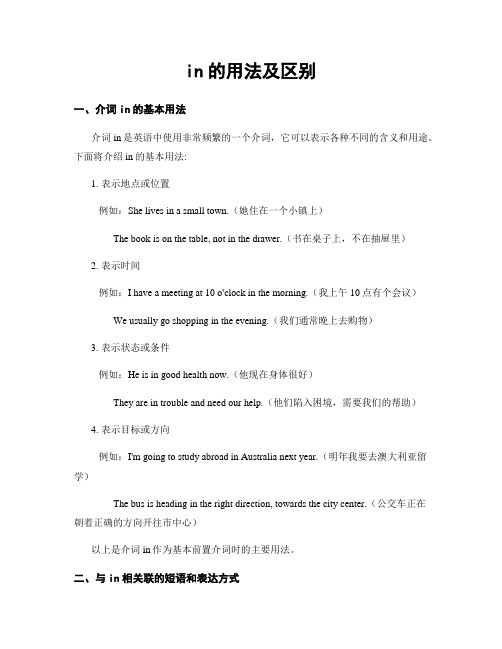
in的用法及区别一、介词in的基本用法介词in是英语中使用非常频繁的一个介词,它可以表示各种不同的含义和用途。
下面将介绍in的基本用法:1. 表示地点或位置例如:She lives in a small town.(她住在一个小镇上)The book is on the table, not in the drawer.(书在桌子上,不在抽屉里)2. 表示时间例如:I have a meeting at 10 o'clock in the morning.(我上午10点有个会议)We usually go shopping in the evening.(我们通常晚上去购物)3. 表示状态或条件例如:He is in good health now.(他现在身体很好)They are in trouble and need our help.(他们陷入困境,需要我们的帮助)4. 表示目标或方向例如:I'm going to study abroad in Australia next year.(明年我要去澳大利亚留学)The bus is heading in the right direction, towards the city center.(公交车正在朝着正确的方向开往市中心)以上是介词in作为基本前置介词时的主要用法。
二、与in相关联的短语和表达方式1. be interested in这个短语表示对某事感兴趣的意思。
例如:She is interested in learning new languages.(她对学习新语言很感兴趣)2. be involved in这个短语表示参与某种活动或事情。
例如:He is involved in a charity campaign to help those in need.(他参与了一项慈善活动,帮助那些有需要的人)3. result in这个短语表示导致某种结果。
介词in的用法及例子
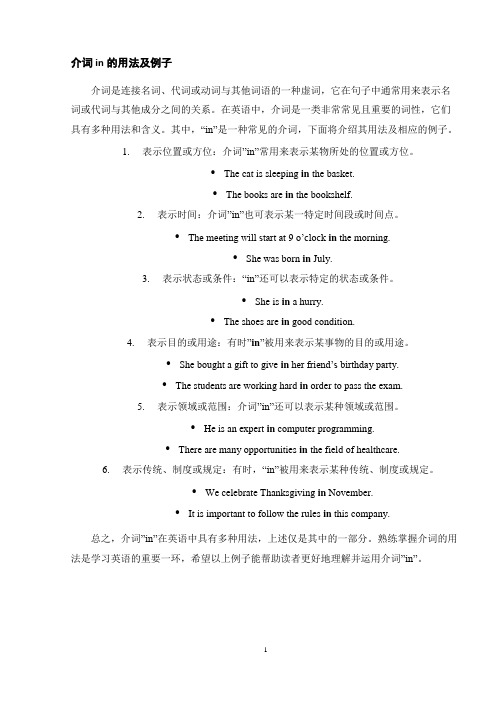
介词in的用法及例子介词是连接名词、代词或动词与其他词语的一种虚词,它在句子中通常用来表示名词或代词与其他成分之间的关系。
在英语中,介词是一类非常常见且重要的词性,它们具有多种用法和含义。
其中,“in”是一种常见的介词,下面将介绍其用法及相应的例子。
1.表示位置或方位:介词”in”常用来表示某物所处的位置或方位。
•The cat is sleeping in the basket.•The books are in the bookshelf.2.表示时间:介词”in”也可表示某一特定时间段或时间点。
•The meeting will start at 9 o’clock in the morning.•She was born in July.3.表示状态或条件:“in”还可以表示特定的状态或条件。
•She is in a hurry.•The shoes are in good condition.4.表示目的或用途:有时”in”被用来表示某事物的目的或用途。
•She bought a gift to give in her friend’s birthday party.•The students are working hard in order to pass the exam.5.表示领域或范围:介词”in”还可以表示某种领域或范围。
•He is an expert in computer programming.•There are many opportunities in the field of healthcare.6.表示传统、制度或规定:有时,“in”被用来表示某种传统、制度或规定。
•We celebrate Thanksgiving in November.•It is important to follow the rules in this company.总之,介词”in”在英语中具有多种用法,上述仅是其中的一部分。
高中英语介词带in的短语汇集记忆

高中英语介词带in的短语汇集记忆1. in + 名词in action 在行动中,实行(into action)in advance 预告, 事先,提前in addition 另外,此外in all 总共, 总计;总之in bed 躺在床上in black and white白纸黑字; 印刷的in blossom (树木)开花in brief 简言之in case (后接从句) 假如,以免,万一in common 共同,共有in comparison (with) 和…比较[= by comparison (with)] in conclusion 最后,总之in condition 健康状况好(out of condition健康状况不好) in consequence 因此,结果in contrast (with) 和...成对照[= by contrast (with)] in danger 处在危险状态in debt 欠债in demand 有需要, 销路好in depth 深入地in despair 绝望in detail 逐一处理;逐一地; 详细地in details 详细地in difficulties 处境困难in dispute 在争论中, 未决的; 有争议的in doubt 有疑问,不确定in essence 本质上, 大体上in existence 存在in fact 事实上,实际上(= in effect = in truth = in reality)in fashion 流行; 时兴in flower 开花in force有效;实施中in full 全部地in future将来in general 通常,大体上in half 成两半in hand 在手头, 在掌握中,在控制中in haste 急速地, 急忙地, 草率地in hospital 住院in itself 本身in life 一生中in line 成一直线,排成一行in love 坠入爱河in luck 走运in nature 本质上in need of 需要,缺少in order 秩序井然,整齐in order that 为了in pain 疼痛in part 部分地in person 亲自in part 部分地in particular特别地,尤其,详细地in peace 安静,宁静in person 亲自, 当面in place 在适当的位置, 适当,得体in practice 在实践中, 实际上in principle 原则上in private 私下里in progress 有进展in public 当众;公开in question 讨论中的;成问题的;考虑中的in rags 穿着破衣in return 作为回报in ruins 一片废墟in secret 秘密地,私下地in sequence 按顺序, 按先后次序in shape 处于良好状态in shock 震惊in short 简言之in sight 被看到,看得见in step 同步,合拍;步伐一致( out of step 步伐不齐) in stock 有存货; 备有(out of stock 无存货) in sum 总而言之2. in + 冠词或修饰语+ 名词in a few words 简言之in a flash 瞬息间in a hurry 匆忙,很快地in a measure 在某种程度上in a mess 乱七八糟, 处境困难in a minute 一会儿in a moment 立刻,马上in a rage 在愤怒中in a sense 从某种意义上说in a tight corner 陷入困境in a tree 在树上in a way 在某种程度上; 就某方面而言in a word 简言之,总之in an odd way 以奇怪的方式,奇怪地in the air 在流行,在传播; 不确定in the day 在白天in the distance 在远处in the distance 在远处in the end 最后,终于in the extreme 极其in the first place 起初;首先,第一点in the future 今后,将来in the last place 最后in the least 一点,丝毫in the long run 从长远来看; 最终in the middle 在中间in the near future 在不久将来in the open 公开的in the past 在过去,以往in the same boat 面临同样的不幸处境in the same way 以同样的方式in the secret 参与阴谋in the short run 从短期来看in the sun 在阳光下in the vicinity 在附近in the way 阻碍in any case 无论如何,总之in any event 无论如何,总之in due course及时地, 在适当时in bad condition 处于不良状态in good (bad) condition 处于良好状态in good faith 真诚地in good taste大方, 得体(反: in bad taste) in high spirits 兴高采烈;起劲;心情欢畅in low spirits士气低沉的in my personal sense 依我之见in no case 决不in no time 立刻; 马上in one’s favor 对…有利(=to one’s advantage) in one’s mind’s eye 在…心目中in one’s opinion 按某人的看法in other words 换句话说; 换言之in this regard 在这一点上,关于这一点in this sense 从这种意义上来说3. in + n. + ofin advance of 在……前面in aid of 帮助in behalf of 为了…的利益(=on behalf of) in case of 以防,万一in celebration of 庆祝in charge of 负责,管理, 指挥,负责照料in consequence of 由于…的缘故in course of 在…过程中, 在…时, 在进行中in danger of 有……的危险in defence (defense) of 保卫,保护,为…辩护in excess of 超过, 较...为多in excuse of 作为…的借口4. in + 冠词+ n. + ofin a position of 设身处地去,能够做到in the case of 就…来说;至于in the company of 伴随着; 在…的陪伴下in the courage of 有…的勇气in the course of 在…过程中,在…期间in the event of 如果,万一in the eyes of 从…的观点来看;在某人看来,在某人眼里(in one’s eyes)in the face of 面对,不顾;纵然in the form of 以…形式in the front of 在…前面,在前部in the habit of 习惯于in the hands of (with) 由…掌握, 控制, 负责in the hope of 怀着…的希望,期待in the light of 考虑到, 根据in the name of 以…的名义in the nature of 属于….性质in the pride of 在…的全盛时期in the order of 大约in the twinkling of an eye 一眨眼, 转眼间in the vicinity of 大约in the view of 按…的意思in the wake of 在…之后in the way of 关于…方面5. in + n. + 其它介词in exchange for 用…作为交换in the mood for 有情绪去做, 有心境做in store for 即将发生;即将到来in addition to 除…外in close vicinity to 在靠近…的地方in contrast to 和…比起来in preference to 优先于in reference to 关于(with reference to)in regard to 关于(with regard to)in accord with 与…一致(out of one’s accord with 同…不一致) in accordance with 按照,与…一致in agreement with 依照, 根据(=according to) in common with 和…有共同点in connection with (to) 关于,和…有联系in comparison with 和…比起来in contrast with (to) 与…成对照;与…对比in line with 符合; 与…一致,按照in touch with 与…有接触, 有联系(out of touch with与…没有联系或接触)in tune with 和谐;融洽(out of tune with 不和谐)。
in 的用法总结
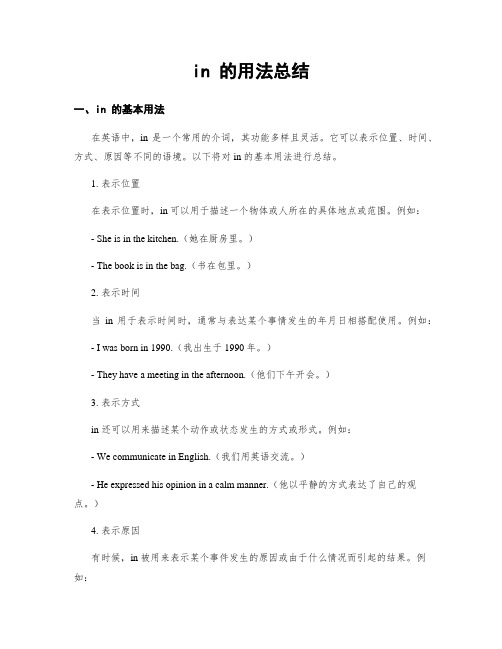
in 的用法总结一、in 的基本用法在英语中,in 是一个常用的介词,其功能多样且灵活。
它可以表示位置、时间、方式、原因等不同的语境。
以下将对 in 的基本用法进行总结。
1. 表示位置在表示位置时,in 可以用于描述一个物体或人所在的具体地点或范围。
例如:- She is in the kitchen.(她在厨房里。
)- The book is in the bag.(书在包里。
)2. 表示时间当in 用于表示时间时,通常与表达某个事情发生的年月日相搭配使用。
例如:- I was born in 1990.(我出生于1990年。
)- They have a meeting in the afternoon.(他们下午开会。
)3. 表示方式in 还可以用来描述某个动作或状态发生的方式或形式。
例如:- We communicate in English.(我们用英语交流。
)- He expressed his opinion in a calm manner.(他以平静的方式表达了自己的观点。
)4. 表示原因有时候,in 被用来表示某个事件发生的原因或由于什么情况而引起的结果。
例如:- She burst into tears in frustration.(她因为沮丧而放声痛哭起来。
)- In his absence, we had to make the decision ourselves.(由于他不在,我们不得不自己做出决定。
)二、in 在短语中的用法除了基本的用法外,in 还在一些常用的短语中发挥特殊作用。
下面将介绍几个典型的例子。
1. in addition(此外)这个短语表示“除此之外还有”的意思,用于对已经提到的事物进行补充。
例如:- The book is well-written, and in addition, it has beautiful illustrations.(这本书写得很好,并且此外还有美丽的插图。
in的用法归纳总结
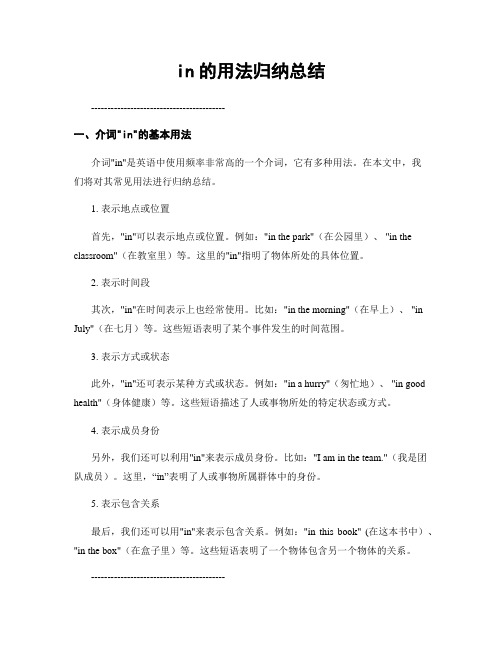
in的用法归纳总结-----------------------------------------一、介词"in"的基本用法介词"in"是英语中使用频率非常高的一个介词,它有多种用法。
在本文中,我们将对其常见用法进行归纳总结。
1. 表示地点或位置首先,"in"可以表示地点或位置。
例如:"in the park"(在公园里)、 "in the classroom"(在教室里)等。
这里的"in"指明了物体所处的具体位置。
2. 表示时间段其次,"in"在时间表示上也经常使用。
比如:"in the morning"(在早上)、 "in July"(在七月)等。
这些短语表明了某个事件发生的时间范围。
3. 表示方式或状态此外,"in"还可表示某种方式或状态。
例如:"in a hurry"(匆忙地)、 "in good health"(身体健康)等。
这些短语描述了人或事物所处的特定状态或方式。
4. 表示成员身份另外,我们还可以利用"in"来表示成员身份。
比如:"I am in the team."(我是团队成员)。
这里,“in”表明了人或事物所属群体中的身份。
5. 表示包含关系最后,我们还可以用"in"来表示包含关系。
例如:"in this book" (在这本书中)、"in the box"(在盒子里)等。
这些短语表明了一个物体包含另一个物体的关系。
-----------------------------------------二、与“in”相关的常见短语除了上述基本用法外,有一些与“in”相关的常用短语也非常值得我们注意和学习。
介词in on at用法
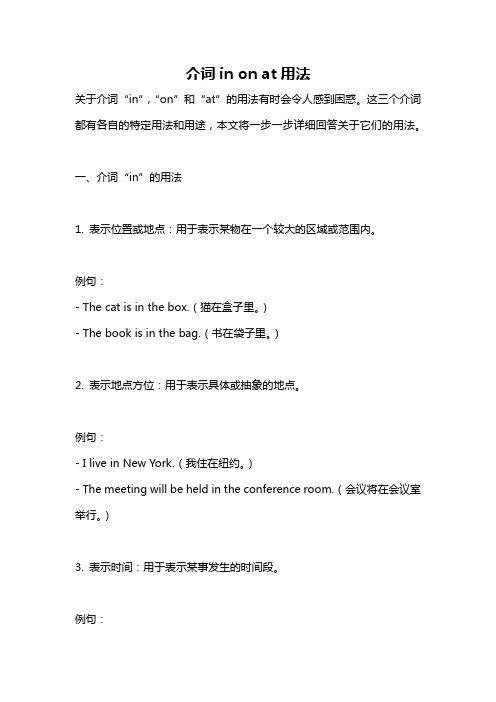
介词in on at用法关于介词“in”,“on”和“at”的用法有时会令人感到困惑。
这三个介词都有各自的特定用法和用途,本文将一步一步详细回答关于它们的用法。
一、介词“in”的用法1. 表示位置或地点:用于表示某物在一个较大的区域或范围内。
例句:- The cat is in the box.(猫在盒子里。
)- The book is in the bag.(书在袋子里。
)2. 表示地点方位:用于表示具体或抽象的地点。
例句:- I live in New York.(我住在纽约。
)- The meeting will be held in the conference room.(会议将在会议室举行。
)3. 表示时间:用于表示某事发生的时间段。
例句:- I will see you in the morning.(我早上见你。
)- He likes to go jogging in the evening.(他喜欢晚上去跑步。
)4. 表示状态或条件:用于表示某人或某物的状态、条件或情况。
例句:- She is in good health.(她身体很好。
)- The car is in excellent condition.(这辆车的状态非常好。
)5. 表示媒介或手段:用于表示某事物通过什么方式或媒介进行。
例句:- She learned French in school.(她在学校学习法语。
)- I communicate with my friends in English.(我用英语与朋友交流。
)二、介词“on”的用法1. 表示位置:用于表示某物或某人处于某个平面、表面或位置上。
例句:- The book is on the table.(书在桌子上。
)- The cat is sitting on the chair.(猫坐在椅子上。
)2. 表示日期和时间:用于表示某一具体的日期或时间。
介词in的用法归纳
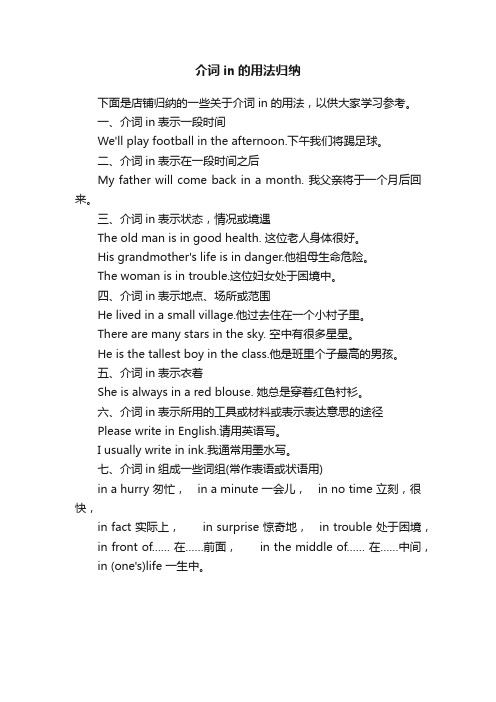
介词in的用法归纳下面是店铺归纳的一些关于介词in的用法,以供大家学习参考。
一、介词in表示一段时间We'll play football in the afternoon.下午我们将踢足球。
二、介词in表示在一段时间之后My father will come back in a month. 我父亲将于一个月后回来。
三、介词in表示状态,情况或境遇The old man is in good health. 这位老人身体很好。
His grandmother's life is in danger.他祖母生命危险。
The woman is in trouble.这位妇女处于困境中。
四、介词in表示地点、场所或范围He lived in a small village.他过去住在一个小村子里。
There are many stars in the sky. 空中有很多星星。
He is the tallest boy in the class.他是班里个子最高的男孩。
五、介词in表示衣着She is always in a red blouse. 她总是穿着红色衬衫。
六、介词in表示所用的工具或材料或表示表达意思的途径Please write in English.请用英语写。
I usually write in ink.我通常用墨水写。
七、介词in组成一些词组(常作表语或状语用)in a hurry 匆忙,in a minute 一会儿,in no time 立刻,很快,in fact 实际上,in surprise 惊奇地,in trouble 处于困境,in front of…… 在……前面,in the middle of…… 在……中间,in (one's)life 一生中。
介词的用法in

介词的用法in一、介词的定义与基本用法介词是英语语法中的重要部分,用于连接名词、代词或者动词与其他句子成分之间的关系。
它能够表达时间、位置、原因、目的等各种概念。
在这篇文章中,我们将详细讨论介词“in”的用法。
1. 表示时间介词“in”常用于表示特定的时间段或日期。
例如:“in the morning”(早上),“in July”(七月),它们表明事件发生在某个具体的时间点或者时间段内。
2. 表示地点除了表示时间,介词“in”还可以表示地点。
当表达某人或某物处于一个封闭空间时,我们可以使用“in”。
例如:“in the room”(在房间里),“in the city”(在城市里)。
3. 表示状态或条件此外,“in”还可以表示某人或某物的状态或条件。
例如:“be in trouble”(陷入麻烦),“be in good health”(身体健康)。
这些表达方式强调一个人或物品所处的状态和现状。
二、具体用法解析1. 在国家、城市和地区名称前使用我们通常使用“in”来指代国家和城市等具体位置。
比如,“I live in China.” (我住在中国),“She works in London.”(她在伦敦工作)。
对于地区或建筑物的名称,同样也使用介词“in”。
2. 在特定时间前使用当我们想要表示某个动作发生的具体时间时,可以使用介词“in”。
例如:“I will see him in an hour.”(我一个小时后会见他)。
此外,还有一些表达方式如“in the morning”、“in the afternoon”等。
3. 表示领域、语言和学科介词“in”也可用于表示人们活动的领域、使用的语言以及进行学习的学科。
例如:“He works in the fashion industry.”(他在时尚行业工作),“She is fluent in French.”(她精通法语)。
4. 表示一段时间内除了表示具体时间点,介词“in”还可用于表示一段持续的时间内。
in介词短语归纳

in 介词短语(作状语、表语)
井然有序in order
一般地in general
共同拥有in common
轮流、依次in turn
怀疑地in doubt
处于困境中in trouble
在适当位置in place
及时;终于in time
亲自in person
在实践中in practice
特别in particular
in brief
总之(3)in short
in a word
事实上in fact
吃惊地in surprise
处于危险中in danger
储备着、即将到来in store
总共in total
详细地in detail
万一…(conj.)+从句in case
如果(介词短语)in case of…
支持in favour of …
为了向…表达敬意in honour of…
面对…in face of…
负责(…)in charge (for…)
需要(…)in need(of…)
作(为对…的)回报in return (for…)
(为…)做准备in preparation (for…)
在…前面in front of…(外部)
在…前面in the front of…(内部)
寻找…in search of …
尽管…,不管…in spite of …
用…的方式表达in terms of …
以…的名义in the name of…
在…看来in the eyes o…f
怀着…的希望。
介词in的用法及例子
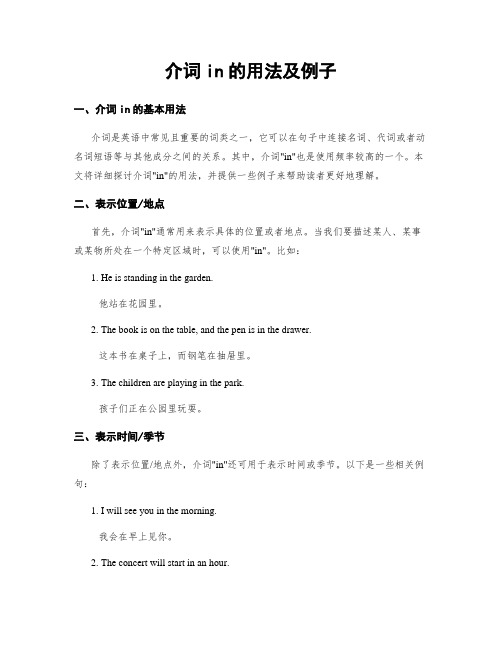
介词in的用法及例子一、介词in的基本用法介词是英语中常见且重要的词类之一,它可以在句子中连接名词、代词或者动名词短语等与其他成分之间的关系。
其中,介词"in"也是使用频率较高的一个。
本文将详细探讨介词"in"的用法,并提供一些例子来帮助读者更好地理解。
二、表示位置/地点首先,介词"in"通常用来表示具体的位置或者地点。
当我们要描述某人、某事或某物所处在一个特定区域时,可以使用"in"。
比如:1. He is standing in the garden.他站在花园里。
2. The book is on the table, and the pen is in the drawer.这本书在桌子上,而钢笔在抽屉里。
3. The children are playing in the park.孩子们正在公园里玩耍。
三、表示时间/季节除了表示位置/地点外,介词"in"还可用于表示时间或季节。
以下是一些相关例句:1. I will see you in the morning.我会在早上见你。
2. The concert will start in an hour.音乐会将在一个小时后开始。
3. We always go skiing in winter.我们总是冬天去滑雪。
四、表示容器/包含关系此外,介词"in"还可以用来表示容器或者包含关系。
例如:1. She keeps her jewelry in a small box.她把珠宝放在一个小盒子里。
2. The water bottle is in my backpack.水瓶在我的背包里。
3. There are many books in the library.图书馆里有很多书。
五、表示语言/领域除了以上几种用法,介词"in"还可以用来表达使用的语言或者所属的领域。
in的三种用法
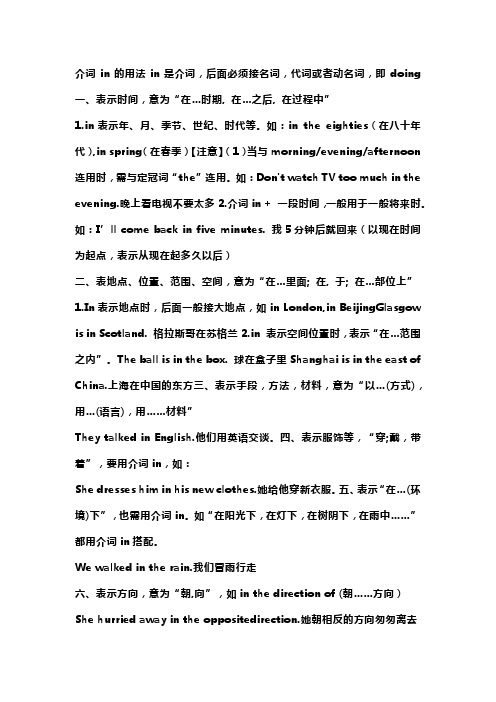
介词in的用法in是介词,后面必须接名词,代词或者动名词,即doing一、表示时间,意为“在…时期, 在…之后, 在过程中”1.in表示年、月、季节、世纪、时代等。
如:in the eighties(在八十年代),in spring(在春季)【注意】(1)当与morning/evening/afternoon 连用时,需与定冠词“the”连用。
如:Don't watch TV too much in the evening.晚上看电视不要太多2.介词in + 一段时间,一般用于一般将来时。
如:I’ll come back in five minutes. 我5分钟后就回来(以现在时间为起点,表示从现在起多久以后)二、表地点、位置、范围、空间,意为“在…里面; 在, 于; 在…部位上”1.In表示地点时,后面一般接大地点,如in London,in BeijingGlasgow is in Scotland. 格拉斯哥在苏格兰2.in 表示空间位置时,表示“在…范围之内”。
The ball is in the box. 球在盒子里Shanghai is in the east of China.上海在中国的东方三、表示手段,方法,材料,意为“以…(方式),用…(语言),用……材料”They talked in English.他们用英语交谈。
四、表示服饰等,“穿;戴,带着”,要用介词in,如:She dresses him in his new clothes.她给他穿新衣服。
五、表示“在…(环境)下”,也需用介词in。
如“在阳光下,在灯下,在树阴下,在雨中……”都用介词in搭配。
We walked in the rain.我们冒雨行走六、表示方向,意为“朝,向”,如in the direction of (朝……方向)She hurried away in the oppositedirection.她朝相反的方向匆匆离去七、表示数量、程度、比例,意为“按,以;在...中”,如in large numbers(数量极大的)One child in twenty has this disease.二十个小孩中有一个患有这种疾病。
in在地点的用法

in在地点的用法在地点的用法一、介词"in"的基本含义介词"in"是英语中常见的一个介词,它有多个基本含义,其中之一就是表示"在……之内或周围"。
除此之外,它还可以表示目标、状态和方式等。
在地点方面,介词"in"用法广泛且灵活。
二、"in"表示所处的具体地点1. 表示城市或国家:我们常说"In Beijing, China."(在中国北京)"I live in New York."(我住在纽约)。
2. 表示建筑物或房间:例如"In the restaurant."(在餐厅里)"He is in his office."(他在他的办公室里)。
3. 表示限定区域:例如"In the park."(在公园里) "She is waiting for you in the lobby."(她正在大厅等你)。
三、以"in"为前缀构成的短语1. "in front of": 在......前面。
例如:"There is a car parked in front of my house."(有一辆车停在我房子前面)2. "in the middle of": 在......中央/中间。
例如:"The statue is placed in the middleof the square."(这座雕像放置于广场中央)3. "in the corner of": 在......角落里。
例如:"The cat likes to sleep in the corner of the room."(这只猫喜欢在角落里睡觉)4. "in the back of": 在......后部/背后。
时间介词in的用法

时间介词in的用法
in一般用于表示一个较长的时间段,如几年、几个月、几周、几天、几小时等。
【常见搭配】
1. in +数字+年(years):表示“几年以后”,如:in five years(五年以后)
2. in +数字+月(months):表示“几个月以后”,如:in three months(三个月以后)
3. in +数字+周(weeks):表示“几周以后”,如:in two weeks(两周以后)
4. in +数字+天(days):表示“几天以后”,如:in ten days (十天以后)
5. in +数字+小时(hours):表示“几小时以后”,如:in two hours(两小时以后)
6. in +季节、月份等:表示“在某个季节、月份”,如:in summer(在夏季)、in April(在四月)
7. in +年数:表示“在某一年”,如:in 1987(在1987年)
【拓展】
除了表示一段时间以后的用法,in还可以有其他用法:
1.表示状况或状态的时间:如in trouble(陷入困境)、in love (恋爱中)
2.表示具体时间点内的时间:如in the morning(早上)、in the afternoon(下午)
3.表示在某些情况下的时间:如in case of emergency(在紧急情况下)
4.表示在某一状态或情境中的时间:如in public(在公共场合)。
in、on的用法

in、on的用法一、介词in与on的基本用法介词是英语语法中的重要组成部分,常用来表示人或物在空间、时间或关系上的位置或动态关系。
其中,介词in与on都经常被使用,并且在一些情况下容易引起混淆。
本文将从空间和时间两个方面详细讨论in与on的用法,帮助读者正确理解并运用这两个介词。
二、空间方面的用法1. in的基本意思为“在某个范围之内”,常用于描述被围起来、有界限或地理位置较精确的区域,例如:- I live in a small town.(我住在一个小镇上。
)- The cat is sleeping in the box.(猫咪正在盒子里睡觉。
)2. on则表示“位于底面之上”或“接触到表面”,通常指较大或较平坦的区域,例如:- The book is on the table.(书在桌子上。
)- There are flowers on the lawn.(草坪上开满了花。
)3. 在特定场景下,in和on也可表示具体的交通工具:- We travel in a car.(我们乘坐汽车旅行。
)- She is on a plane to Beijing.(她正在飞往北京的飞机上。
)总而言之,in强调“内部”,on强调“接触表面”。
三、时间方面的用法1. in表示某段时间的年、月、季度或特定时刻:- I was born in 1990.(我出生于1990年。
)- We will have a meeting in the afternoon.(下午我们将开会。
)2. on可指具体日期、星期几或节日等固定时间点:- The concert will be held on Sunday.(音乐会将在周日举行。
)- They always celebrate Christmas on December 25th.(他们总是在12月25日庆祝圣诞节。
)3. 此外,在表示“早上”、“下午”等含义方面,in和on也有所区别:- I go for a walk in the morning.(早晨我去散步。
in the的用法区别

in the的用法区别一、介词in的基本意义及用法介词in是英语中最常见的介词之一,它有多种意义和用法。
下面将从空间方位、时间、状况和动作方式几个方面来讨论in的用法。
1. 空间方位在空间方位上,in表示位置或被围绕。
例如:(1) He is in the room.(他在房间里。
)(2) The books are in the bookshelf.(书在书架上。
)除了表示位置,in还表示某物所处的范围。
例如:(3) She is in her twenties.(她二十几岁。
)2. 时间在时间上,in通常与具体月份、季节和年代连用。
例如:(1) I was born in October.(我生于十月。
)(2) We will go swimming in summer.(我们夏天去游泳。
)此外,在表示几点钟时,也使用介词in。
(3) The meeting will start at quarter past ten in the morning.(会议将于上午十点一刻开始。
)3. 状况在描述状况时,in表达事物所处的状态或情况:(1) She is in good health now.(她现在身体很健康。
)(2) The dog is in a deep sleep.(那只狗正在沉睡中。
)4. 动作方式in也可以表示某种动作的方式。
例如:(1) He walked in silence.(他默默无言地走着。
)(2) She ate the cake in one bite.(她一口吃掉了蛋糕。
)综上所述,介词in在空间方位、时间、状况和动作方式等方面都有广泛的应用。
二、the与in的用法区别1. 用法不同the是定冠词,用于特指某人或某物,表示“那个”、“这个”、“该”的意思。
而in是介词,在句子中主要表示位置、范围和方式等概念。
2. 出现位置不同the通常出现在名词之前,限定特定事物或人。
- 1、下载文档前请自行甄别文档内容的完整性,平台不提供额外的编辑、内容补充、找答案等附加服务。
- 2、"仅部分预览"的文档,不可在线预览部分如存在完整性等问题,可反馈申请退款(可完整预览的文档不适用该条件!)。
- 3、如文档侵犯您的权益,请联系客服反馈,我们会尽快为您处理(人工客服工作时间:9:00-18:30)。
介词in,on与at都可用于表示时间的名词前,但用法各不相同,其区别在于:一、用in的场合(1)表示“在某年/月/季节”这个含义时,须用介词in。
例如:She came to this city in 1980.他于1980年来到这个城市。
It often rains here in summer.夏天这里常常下雨。
(2)表示“从现在起一段时间以后”时,须用介词in。
例如:They will go to see you in a week.他们将在一周后去看望你。
I will be back in a month.我将在一个月后回来。
(3)表示“在某世纪”时,须用介词in.例如:This machine was invented in the eighteenth century.这台机器是在18世纪发明的.Great changes took place in the twentieth century.20世纪发生了巨大变化.(4)表示“在某年代或特定世纪某年代”时,须用介词in。
例如:This incident happened in the 1970''''s.该事件发生在20世纪70年代。
The Anti-Japanese War broke out in the 1930''''s.抗日战争爆发于20世纪30年代。
除此之外,morning / evening / afternoon 三个词也常跟介词in连用。
例如:Don't watch TV too much in the evening.晚上看电视不要太多。
They sometimes play games in the afternoon.他们有时在下午做游戏。
二、用on的场合(1)表示“在具体的某一天”或“(在具体的某一天的)早上、中午、晚上”等,须用介词on。
例如:Jack was born on May 10th,1982.杰克生于1982年5月10日。
They left on a rainy morning.他们是在一个雨天的早上离开的。
He went back to America on a summer afternoon.他于一个夏天的下午返回了美国。
(2)表示“在星期几”或“在星期几的早上、中午、晚上”等,须用介词on。
例如:We don't go to school on Saturday and Sunday.我们星期六和星期天不上学。
What time do you get up on weekdays?你在平日什么时候起床?I heard this story on Saturday morning.我是在星期六的早晨听到这个故事的。
(3)表示“在某一节日”时,须用介词on。
例如:We usually eat mooncakes on Mid-autumn Festival.我们通常在中秋节吃月饼。
Mr Hu received a card on Teachers''''Day.胡老师在教师节那天收到了一张卡片。
注意:当morning,evening,afternoon被of短语修饰,习惯上用in,而不用on.例如:in the early morning of September 10th 在9月10的清晨;in the late afternoon of September 12th 在9月12日的傍晚。
三、用at的场合(1)表示“某一具体时刻(即几点几分时)”,须用介词at。
例如:He gets up at six o''''clock every day .他每天六点起床。
I got home at five thirty yesterday afternoon.我昨天下午五点半到家。
(2)用在特定的时候(时节、时机)时,须用介词at。
例如:They were happy at that time.他们那时很幸福。
I think the shop is clcsed at this time of day.我认为商店在白天的这个时候关门了。
(3)表示“在中午、在夜晚、在周末”时,须用介词at。
例如:What do you often do at noon?你中午经常做些什么?You can see many stars in the sky at night.夜晚你能看到天空中有许多星星。
(4)表示“在……岁”时,须用介词at。
例如:At the age of nine ,the boy could swim well.在九岁的时候,这孩子就游泳游得很好了。
At the age of twenty,I began to teach English at this school.在二十岁的时候,我就开始在这所学校教英语了。
注意:在含有next ,last,this,one ,any, each, every , some, all的词组和tomorrow,yesterday, the day after tomorrow, the day before yesterday 前不用任何介词。
例如:What did you do last summer holidays?去年暑假你做了些什么?What are you going to do the day after tomorrow?后天你打算做什么?英语中on,at,in的用法与区别AT 表示某一特定的时间。
例:at 3 o’clock (在3点)at 10:30am (在上午10点30分)at noon (在中午)at bedtime (在夜间)at sunset/at sunrise (在日落/日出时)at the moment (在那瞬间)ON 表示日期例:on Sunday (or any day of the week) (在周六)on 6 March (在3月六日)on Christmas Day (在圣诞节)on my birthday (在我的生日那天)on New Year’s Eve (在新年前夕)IN 表示月,年,世纪和更长的时间段例:in May (or any month of the year) (在五月)in summer (在夏天)in 1990 (在1990 年)in the next century (在下个世纪)in the Ice Age (在冰川时期)如何记忆这三个表示时间的前置词的用法呢。
我建议你首先记住三个有代表性的短语。
以后遇到其他用法是按时间段来推断。
在三个短语是:at 5:00am (那一时刻),on 10 October (在10月10日),in the Ice Age (在冰川时期)。
注意在at 5:00am 中的am, 在on 10 October 中的October , 在in the Ice Age 中的Ice,它们都提醒你前置词的第一个字母。
你记住了这三个短语,以后遇到其他用法是按时间段来推断。
一. in,on在方位名词前的区别1. in表示A地在B地范围之内。
如:Taiwan is in the southeast of China.2. on表示A地与B地接壤、毗邻。
如:North Korea is on the east of China.二. at, in, on在表示时间上的区别1. at指时间表示:(1)时间的一点、时刻等。
如:They came home at sunrise (at noon, at midnight, at ten o’clock, at daybreak, at dawn). (2)较短暂的一段时间。
可指某个节日或被认为是一年中标志大事的日子。
如:He went home at Christmas (at New Year, at the Spring Festival, at night).2. in指时间表示:(1)在某个较长的时间(如世纪、朝代、年、月、季节以及泛指的上午、下午或傍晚等)内。
如:in 2004, in March, in spring, in the morning, in the evening, etc(2)在一段时间之后。
一般情况下,用于将来时,谓语动词为瞬间动词,意为“在……以后”。
如:He will arrive in two hours.谓语动词为延续性动词时,in意为“在……以内”。
如:These products will be produced in a month.注意:after用于将来时间也指一段时间之后,但其后的时间是“一点”,而不是“一段”。
如:He will arrive after two o’clock.3. on指时间表示:(1)具体的时日和一个特定的时间,如某日、某节日、星期几等。
如:On Christmas Day(On May 4th), there will be a celebration.(2)在某个特定的早晨、下午或晚上。
如:He arrived at 10 o’clock on the night of the 5th.(3)准时,按时。
如:If the train should be on time, I should reach home before dark.三. at, in和on表示地点时的区别1. at表示地点:(1)用于指较小的地方。
如:I shall wait for you at the station.(2)用于门牌号码前。
如:He lives at 115 Zhongshan Road.2. in表示地点:(1)用于指较大的地方。
如:He lives in Shanghai.(2)虽然是很小的地方,如果说话人住在那里,也可用in。
商店、学校、机关等,若看作一个地点(point)用at,若看作一个场所(place)用in。
如:I met him at the post-office.I’m now working in the post-office.3. on表示地点,一般指与面或线接触,意为“在……上;在……旁”。
如:The picture was hanging on the wall.New York is on the Hudson River.。
